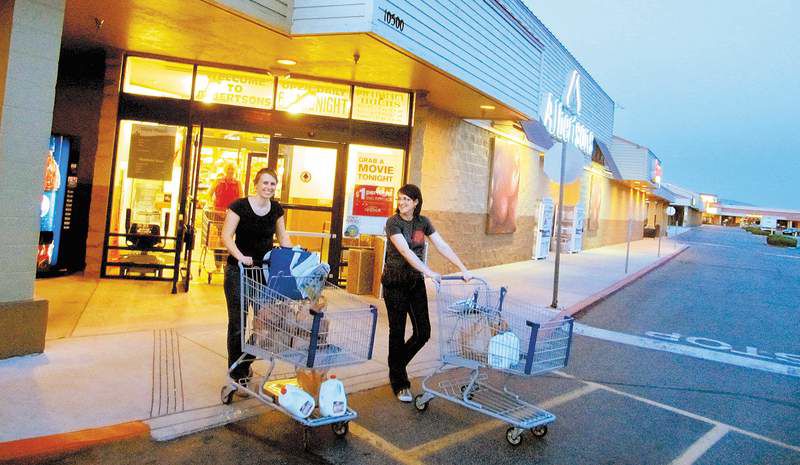In the grocery game, bruised buyers seek any edge possible
Published 5:00 am Tuesday, August 2, 2011

- Shoppers leave an Albertson's in Boise, Idaho. According to the 2011 Consumer and Product Insight Survey, almost half of survey respondents said they're purchasing less expensive goods now because of the money they're spending on gas. “It's just an issue of consumers ... being much more purposeful as to what they buy, how much they buy and where they buy it,” says the vice president of the consulting firm that did the survey.
If you’re feeling “bruised,” “remorseful” or particularly “introspective” these days, wait before taking your woes to a shrink. First try changing your grocery shopping habits.
Pat Conroy, vice chairman of consulting firm Deloitte, says the American grocery shopper has been close to traumatized by this economy. If previous recessions “bruised” American shoppers, this recession left a “scar” that may never heal.
At least, that’s what Deloitte’s new 2011 Consumer and Product Insight Survey shows.
“It’s just an issue of consumers changing their mindsets and being much more purposeful as to what they buy, how much they buy and where they buy it,” Conroy said.
According to the study, there’s a revolution under way. Shoppers are seeing smaller packages with higher prices. Those price increases, combined with the rising cost of gas, have forced consumers to be smarter about how they spend their money. Almost half of survey respondents said they’re purchasing less expensive goods now because of the money they’re spending on gas.
Conroy put it this way: “It’s a zero sum game. If I have to spend more money on gas, that leaves me less money to spend elsewhere.”
As consumers become more informed, they’re realizing that there isn’t much difference between store-brand and name-brand products. Some 40 percent of respondents said they purchase private labels, Conroy said.
German-owned grocery chain Aldi sells almost entirely private brand merchandise. Since its first store opened in 1971 in Iowa, Aldi has grown to more than 1,100 stores in more than 31 states. The retailer plans to open 80 new stores this year, including its third Charlotte, N.C.-area location, opening on Thursday.
“To me, it’s the same,” says Charlotte, resident Liz Withers said. “I can find good deals here.” Withers goes to Aldi when she’s “budget shopping.” She says she’d rather save money than buy expensive name-brand products.
Stores are responding to shoppers like Withers and pushing their own brands. Salisbury, N.C.,-based Food Lion ran a monthlong promotion earlier this summer to promote its private labels, and Matthews, N.C.,-based Family Dollar recently hired Texas-based Marketing Management, Inc. to help expand its private label business.
In the past, private labels may have been viewed as knock-off versions of better products, Conroy said, but that’s not the case anymore. “Behind the scenes, (retailers) have really invested in quality,” he said.
Consumers aren’t just changing what they buy — they’re changing where they buy it. The study found that 80 percent of respondents bought food at a traditional supermarket in the past year. That supports findings from the American Pantry Study, conducted last year by Deloitte, which found that the majority of Americans felt “guilty and remorseful” for how they used to shop.
For example, instead of spending hundreds of dollars in superstores buying bulk goods, shoppers are perusing traditional supermarkets again.
At supermarkets, Conroy said, shoppers tend to be less impulsive and more “introspective” in deciding how much of a product they buy.
Shoppers are also using their smart phones to plan more efficient shopping trips. More than 30 percent of respondents said they have used their phone while in the store to research food prices or product information. And more than 40 percent said they’ve managed their shopping list on a mobile device before going to the store.
Major companies are also developing shopping applications for smart phone users. Shop Nearby, an iPhone application, helps consumers find the closest store with the product they want, while ShopSavvy scans barcodes and compares prices at tens of thousands of retailers.






